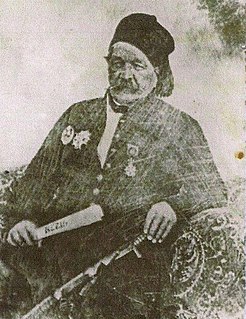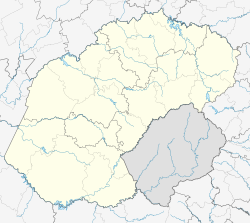
"Ozymandias" is the title of two related sonnets published in 1818.

Osama bin Mohammed bin Awad bin Laden, also rendered Usama bin Ladin, was a Saudi Arabian-born Yemeni terrorist who was the founder of the pan-Islamic militant organization al-Qaeda. He was a Saudi Arabian citizen until 1994, a member of the wealthy bin Laden family, and an ethnic Yemeni Kindite.
Liberalism and progressivism within Islam involve professed Muslims who are a considerable body of liberal thought on the original interpretation of Islamic understanding and practice. Their work is sometimes characterized as "progressive Islam" ; some regard progressive Islam and liberal Islam as two distinct movements.

Saudi Arabia, officially the Kingdom of Saudi Arabia, is a sovereign state in Western Asia constituting the bulk of the Arabian Peninsula. With a land area of approximately 2,150,000 km2 (830,000 sq mi), Saudi Arabia is geographically the largest sovereign state in the Middle East, the second-largest in the Arab world, the fifth-largest in Asia, and the 12th-largest in the world. Saudi Arabia is bordered by Jordan and Iraq to the north, Kuwait to the northeast, Qatar, Bahrain, and the United Arab Emirates to the east, Oman to the southeast and Yemen to the south; it is separated from Israel and Egypt by the Gulf of Aqaba. It is the only nation with both a Red Sea coast and a Persian Gulf coast, and most of its terrain consists of arid desert, lowland and mountains. As of October 2018, the Saudi economy was the largest in the Middle East and the 18th largest in the world. Saudi Arabia also has one of the world's youngest populations; 50 percent of its 33.4 million people are under 25 years old.

Thomas Hope was a Dutch and British merchant banker, author, philosopher and art collector, best known for his novel Anastasius, a work which many experts considered a rival to the writings of Lord Byron. His sons included Henry Thomas Hope and Alexander Beresford Hope.

Islam is the state religion of Saudi Arabia. The connection between Islam and Saudi Arabia is uniquely strong. The kingdom, which sometimes is called the "home of Islam", is the location of the cities of Mecca and Medina, where Muhammad, the messenger of the Islamic faith, lived and died, and attracts millions of Muslim Hajj pilgrims annually, and thousands of clerics and students who come from across the Muslim world to study. The official title of the King of Saudi Arabia is "Custodian of the Two Holy Mosques"—the two being Al-Masjid al-Haram in Mecca and Al-Masjid al-Nabawi in Medina—which are considered the holiest in Islam.

Rajm is an Arabic word that means "stoning". It is commonly used to refer to the Hudud punishment wherein an organized group throws stones at a convicted individual until that person dies. Under some versions of Islamic law (Sharia), it is the prescribed punishment in cases of adultery committed by a married man or married woman. The conviction requires a confession from either the adulterer/adulteress, or the testimony of two/three witnesses, or pregnancy outside of marriage.
Fred McGraw Donner is a scholar of Islam and Professor of Near Eastern History at the University of Chicago. He has published several books about early Islamic history.

No God but God: The Origins, Evolution, and Future of Islam is a 2005 non-fiction book written by Iranian-American Muslim scholar Reza Aslan. The book describes the history of Islam and argues for a liberal interpretation of the religion. It blames Western imperialism and self-serving misinterpretations of Islamic law by past scholars for the current controversies within Islam, challenging the "clash of civilizations" thesis.

Pratap Bhanu Mehta is an Indian academic. He was the president of the Centre for Policy Research, a New Delhi-based think tank. and is currently the Vice-Chancellor of Ashoka University since July 2017. He has been described as "one of India’s most thoughtful intellectuals."

Myrtle Reed was an American author, poet, journalist, and philanthropist. She wrote a number of bestsellers and even published a series of cookbooks under the pseudonym Olive Green.

Peter Bergen's The Osama bin Laden I Know (ISBN 978-0-7432-7891-1) is a book published in 2006. It is a comprehensive collection of personal accounts by people who have met Osama bin Laden or worked with him at various stages of his terrorist career.
Augustus Richard Norton was an American professor and army officer. He was a professor of international relations and anthropology at the Pardee School of Global Studies at Boston University. He was best known for his writing on Middle East politics, and as an occasional commentator on U.S. policy in the Middle East.

Bayn al-Qasrayn is the district and plaza between two palaces constructed by the Fatimid dynasty in mediaeval Islamic Cairo, within present day Cairo, Egypt. It is an element in the Fatimid Caliphate founding of the new city of Cairo.
Max Rodenbeck is an American journalist and author, based in Cairo. He grew up in Cairo, having moved there when his father John Rodenbeck took up an academic position at the American University in Cairo in the 1960s. He has been writing for The Economist magazine on Middle Eastern affairs for more than 20 years, and has been the magazine's Chief Middle East Correspondent since 2000. He is also a contributor to publications such as the New York Review of Books, New York Times and Foreign Policy magazine.

Soliman Pasha al-Faransawi, born Joseph Anthelme Sève, was a French-born Egyptian commander.
Friedrich Ludwig Wilhelm Carl Borckenhagen was an Admiral in the Imperial German Navy. He was also an influential writer on naval strategy, and pivotal in introducing the ideas of geostrategist Alfred Thayer Mahan into the German Empire.
Stamen is an internationally recognized data visualization design studio based in San Francisco, California. The studio develops projects for a broad range of clients, including National Geographic, Facebook and The Dalai Lama.

Franklin Street Commercial Historic District is a national historic district located at Michigan City, LaPorte County, Indiana. The district encompasses 73 contributing buildings and 1 contributing object in the central business district and surrounding residential section of Michigan City. It developed between about 1875 and 1955, and includes examples of Italianate, Gothic Revival, Queen Anne, Classical Revival, and Tudor Revival style architecture. Located in the district is the separately listed Michigan City Post Office (1909-1910). Other notable buildings include the Staiger House, Earl House, M & M Diner (1955), Zorn Building (1907), St. Paul's Lutheran Church (1876) and rectory (1888), First Federal Savings Bank, Aicher Block (1914), Brinkman Building, Trinity Episcopal Church (1889), Merchants National Bank Building (1926), Ledbetter Building (1908), Rodenbeck Saloon, First Methodist Episcopal Church (1922), Barker Hall (1929), Masonic Temple (1922-1923), and the Salvation Army Building (1925).

The Big Chance is a 1934 German musical comedy film directed by Victor Janson and starring Hansi Niese, Hans Söhnker and Jakob Tiedtke. It is part of the tradition of operetta films.


















